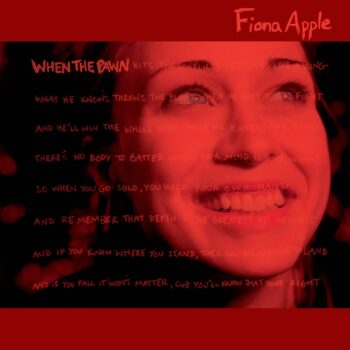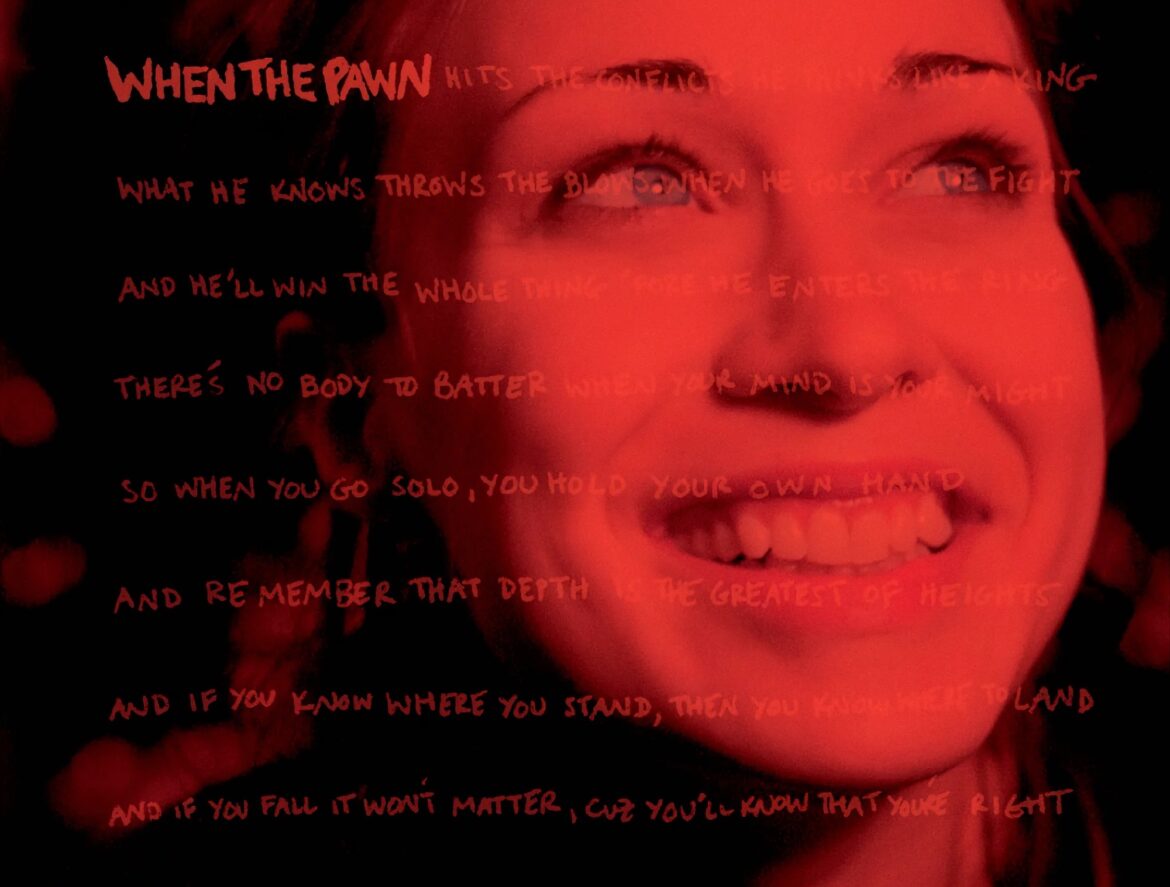24 years ago, singer/songwriter Fiona Apple released her sophomore album ‘When The Pawn…’ The artist is one of the most prolific singer/songwriters of our time, paving the way for so many female artists after her; bearing the brunt of having her art and experiences trivialized and demeaned. But much like her lower back tattoo suggests, Apple has wings to rise above it all.
Stream: ‘When the Pawn…’ – Fiona Apple
In the 24 years that have passed since a 22-year-old Fiona Apple released her gritty, liberating and poignant alternative pop album When The Pawn…, the music industry has seen an influx of moody singer/songwriters that could not have made their cultural impact without the work of Apple.
Emotionally harrowing, deeply evocative and fiery, Apple’s sophomore album truly explores the depths of the human psyche, delving into emotions ranging from sorrow to anguish. The musical complexity and lyrical prowess exhibited by Apple is something only achieved by songwriting icons, like Joni Mitchell and Carole King who came before her.

Part of the reason this sophomore album was, and still is, so groundbreaking is the period in Apple’s career that it was released in. So much of the unadulterated rage and candor exuded in When The Pawn… stems from the genesis of Apple’s career. There was a complete misjudgment of Apple’s image when she was up-and-coming – an image she was not controlling. Rather, a male dominated industry was continually trivializing and demeaning her art.
Due to her age and tremendous success, Apple was endlessly told she could not be capable of creating her music. During the promotional circuit for her debut album, Tidal, Apple shared on MTV’s 120 Minutes, “Some guy in Europe actually told me that he thought that I had made up everything that I had written about because he didn’t think that I could have experienced that much being nineteen.”
Discussing dark topics such as self-image and abusive relationships, no one expected such a young face to be behind lyrics like:
So be it, I’m your crowbar
If that’s what I am so far
Until you get out of this mess
And I will pretend
That I don’t know of your sins
Until you are ready to confess
But all the time, all the time
I’ll know, I’ll know
And you can use my skin
To bury secrets in
– “I Know,” Fiona Apple
In a world full of disbelief, Apple’s sharp tongue cut through this incredulity.
On her second visit to The Howard Stern show in 1997, she responded to many non-believers saying “I don’t care if the Press Room doesn’t care [what I have to say] but there’s girls out there that do care.”
In retaliation to the doubt she faced, the singer began exhibiting the “brat bitch loose cannon” persona she is now known for as she described to Rolling Stone in 1998. In her infamous 1997 VMAs speech she said:
“So, what I want to say is everybody out there that’s watching. This world. This world is bullsh*t. And you shouldn’t model your life about what you think that we think is cool and what we’re wearing and what we’re saying and everything. Go with yourself.”
This is a seemingly tame take now, but at the time it became the singer’s pre-viral “viral moment.” In every interview subsequently she was mocked for the speech, being told by a caller on a radio interview, “Stop preaching. You’re 19 years old and you’re making millions of dollars, nobody cares.”

Apple’s tolerance hit a breaking point after one particularly scathing 1997 Spin Magazine cover piece. In response, Apple wrote the ninety-word poem that would become the title to her sophomore album:
When the pawn hits the conflict he thinks like a king
What he knows throws the blows when he goes to the fight
And he’ll win the whole thing ‘fore he enters the ring
There’s no body to batter when your mind is your might
So when you go solo you hold your own hand
And remember that depth is the greatest of heights
And if you know where you stand then you know where to land
And if you fall it won’t matter ‘cuz you’ll know that you’re right
These ninety words began Apple’s journey to artistic liberation. Despite the backlash Apple was facing, by the time When the Pawn… hit record stores in 1999, she had a cult following that clung to her every word as she sang resonating lyrics like:
He said “It’s all in your head,”
And I said, “So’s everything” but he didn’t get it
I thought he was a man but he was just a little boy
Hunger hurts, and I want him so bad, oh, it kills
‘Cause I know I’m a mess he don’t wanna clean up
I got to fold cause these hands are too shaky to hold
Hunger hurts, but starving works
When it costs too much to love
– “Paper Bag,” Fiona Apple
Apple became “the voice of a new generation of doomy, Sylvia Plath-loving high school girls” according to a Spin Magazine piece in 2000.
Whilst once seen as an insult, the reality is that Apple garnered an audience of young women who were just as rage-filled and emotionally explosive as she was, feeling truly seen by her art. She shared with Spin Magazine, “I’m going to help some little girl out there. I’m going to let her know that I have stretch marks on my ass, and bunions, that I don’t have my shit together. Please say that I don’t have my shit together at all. I want to give that girl some hope.”
Following the release of When The Pawn… Apple began proudly creating music for all of the misunderstood young women, like her, in need of an outlet.
When The Pawn… is not only musically captivating, but it’s also raw. Apple’s roaring vocals, anguish-filled lyricism and enchanting instrumentals creates a kind of sobering whimsy that is deeply grounded in the reality of the human experience. The singer truly pours herself into her art. From her shaking vocals, to passionate performance you can feel her disgust in “Limp,” the agony in “Get Gone,” and the unbridled fury in “On The Bound.” From top to bottom, this ten-track-album can easily be called a masterclass in genre fusion, harrowing metaphors, and tear jerking vocal performances.
Watch Fiona Apple’s roaring performance of “On The Bound”:
For every megastar female singer/songwriter there is now, there is Fiona Apple who came before her.
Apple paved this path alone, battling off misogyny, speaking up about mental health, and advocating for female artists to be taken seriously. The artist is even dedicated to mentoring many of your favorite contemporary female artists, such as King Princess and Phoebe Bridgers, offering them collaboration and camaraderie after all she endured.
Constantly rising above mistreatment and misunderstanding, you begin to truly believe, just like her lower back tattoo alludes to, that “Fiona has wings.”
— — — —

Connect to Fiona Apple on Facebook
Discover new music on Atwood Magazine
© Fiona Apple / Epic Records
When the Pawn…
an album by Fiona Apple


 © Fiona Apple / Epic Records
© Fiona Apple / Epic Records






